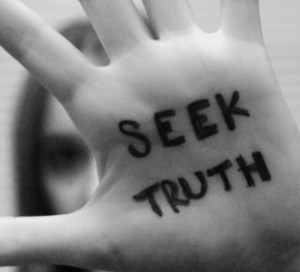In a recent column, Maureen Dowd raised the question, “Why can’t filmmakers tell the story as it actually was?” Lamenting the creative license taken in Oscar nominated films, she objected to the fabricated car chase in Argo, done for dramatic effect, and the historical inaccuracy of the voting process for the 13th amendment in Lincoln, done reportedly for simplicity sake.
Creative non-fiction writers have been dealing unceasingly with the issue of truth, since their motto is “True Stories, Well Told.” In finishing my mother’s memoir due out this summer, I recognize I’ve learned a great deal how complex truth actually is. In my family, as most likely in yours, people who were present for the same events have quite different perspectives on them. My book, Warrior Mother: Fierce Love, Unbearable Loss, and Rituals that Heal tells events from my perspective. My daughter’s then 12 year-old son, her husband, or my son’s stepfather would each have their own views of the events we all shared. As a social worker, I know it’s not productive to ask who’s right? Everyone is right from their own perspective. In literature this is called point of view.
In my retelling of events I discovered that I sometimes misremembered details. An email exchange with my son-in-law resulted in some fact checking on some items I got wrong or didn’t give the emphasis they deserved. And any telling of a long complicated story involves selecting what to include and what to leave out. This selectivity becomes by its very nature, not telling the whole truth. When given the assignment at the Iowa Summer Writing Festival to write a scene from the perspective of someone who is likely to see it differently than me, I discovered that there was a previous scene to the one in question that I hadn’t included. From my perspective it wasn’t important. But telling the story from this other person’s perspective, meant the previous scene had to be included. Later, I decided to leave it in because it added a rich layer to the story.
“Truthiness,” Stephan Colbert’s made up word is defined as something that feels true, intuitively, without regard to the evidence. In spite of it’s being all in fun, I think he’s on to something. In a radio show recently I heard Maya Angelou say that truth is not the same as facts, and that in some instances, facts obscure the truth. Since the meaning of a communication is in how it is received, I like the notion that feelings are facts too, just a different kind.
Then there are the secrets withheld, to protect the innocent, the guilty, or to maintain peace in the family. I wrote a paragraph that involved my son but when I shared it with him he said that wasn’t what he said. His denial did not convince me because in my training as a therapist I was taught to write my client notes so carefully that when called upon to read them out loud in a courtroom under oath, I would feel confident of their accuracy. But whether he said it or he didn’t, I took it out and replaced it with another truth we both could agree on.

